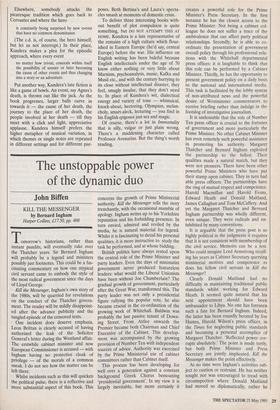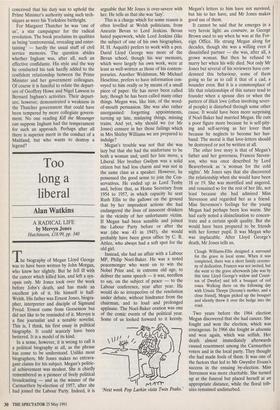The unstoppable power of the dynamic duo
John Biffen
KILL THE MESSENGER by Bernard Ingham Harper Collins, £17.50, pp. 408 Tomorrow's historians, rather than instant pundits, will eventually rake over the Thatcher years. Sir Bernard Ingham will probably be a legend and ministers possibly just footnotes. This could be a fas- cinating commentary on how one atypical civil servant came to embody the style of the most radical government since the days of Lloyd George.
Kill the Messenger, Ingham's own story of the 1980s, will be quarried for revelations on the conduct of the Thatcher govern- ment. The reader will be mildly disappoint- ed after the advance publicity and the tangled episode of the censored texts.
One incident does deserve emphasis. Leon Brittan is clearly accused of having authorised the leak of the Solicitor General's letter during the Westland affair. The erstwhile cabinet minister and now European Commissioner is accused — with Ingham having no protective cloak of privilege — of the morals of a common sneak. I do not see how the matter can be left there.
Whilst incidents such as this will quicken the political pulse, there is a reflective and more substantial aspect of this book. This concerns the growth of Prime Ministerial authority. Kill the Messenger tells the story trenchantly, with the occasional mumble of apology. Ingham writes up to his Yorkshire reputation and his forbidding presence. In turn envied, admired and reviled by the media, he is natural material for legend. Whilst it is fascinating to detail his personal qualities, it is more instructive to study the task he performed, and at whose bidding. British politics have always rested upon the central role of the Prime Minister and party leaders. Even the days of minimalist government never produced featureless leaders: what would the Liberal Unionists have been without Joe Chamberlain? The gradual growth of government, particularly after the Great War, transformed this. The party leader was not only a presidential figure rallying the popular vote, he also became crucial in the co-ordination of the growing work of Whitehall. Baldwin was probably the last passive tenant of Down- ing Street. From Attlee onwards the Premier became both Chairman and Chief Executive of the Cabinet. This develop- ment was accompanied by the growing provision of Number Ten with independent sources of advice. Authority was exercised by the Prime Ministerial use of cabinet committees rather than Cabinet itself.
This process has been developing for well over a generation against a constant background Greek Chorus bemoaning `presidential government'. In my view it is largely inevitable, but more certainly it creates a powerful role for the Prime Minister's Press Secretary. In the first instance he has the closest access to the Prime Minister. Not being a cabinet col- league he does not suffer a trace of the ambivalence that can affect party political relationships. Secondly, he is able to co- ordinate the presentation of government overall policy through his professional rela- tions with the Whitehall departmental press offices: it is laughable to think that this role can be performed by a Cabinet Minister. Thirdly, he has the opportunity to present government policy on a daily basis to the national and international media. This task is facilitated by the lobby system of non-attributed news and the powerful desire of Westminster commentators to receive briefing rather than indulge in the footslog of investigative journalism.
It is undeniable that the role of Number Ten press officer is crucial to the fortunes of government and more particularly the Prime Minister. No other Cabinet Minister has even remotely such powerful assistance in promoting his authority. Margaret Thatcher and Bernard Ingham exploited the partnership to the fullest. Their qualities made a natural match, but they were not pioneers. There have been other powerful Prime Ministers who have put their stamp upon cabinet. They in turn had able press officers. The partnerships have the ring of mutual respect and competence: Harold Macmillan and Harold Evans, Edward Heath and Donald Maitland, James Callaghan and Tom McCaffery. And yet the Margaret Thatcher and Bernard Ingham partnership was wholly different, even unique. They were radicals and un- inhibited by many conventions.
It is arguable that the press post is so highly political in the judgments it requires that it is not consistent with membership of the civil service. Memoirs can be a test. Who could imagine Lord Armstrong recall- ing his years as Cabinet Secretary querying ministerial motives and competence as does his fellow civil servant in Kill the Messenger?
Clearly Donald Maitland had no difficulty in maintaining traditional public standards whilst working for Edward Heath. It seemed quite natural that his next appointment should have been ambassador to Libya. No one has foreseen such a fate for Bernard Ingham. Indeed, the latter has been roundly berated by Joe Haines, Harold Wilson's press officer, in the Times for neglecting public standards and becoming a personal accomplice of Margaret Thatcher. 'Reflected power cor- rupts absolutely.' The point is made tartly, but both Prime Minister and Press Secretary are jointly implicated. Kill the Messenger makes the point effectively.
At no time were Ingham's activities sub- ject to caution or restraint. He has neither sought nor was encouraged to tread with circumspection where Donald Maitland had moved so diplomatically; rather he conceived that his duty was to uphold the Prime Minister's authority using such tech- niques as were his Yorkshire birthright.
For Margaret Thatcher he was 'one of us', a star campaigner for the radical revolution. The book proclaims its qualities as being 'controversial, revealing and enter- taining' — hardly the usual stuff of civil service memoirs. The question abides whether Ingham was, after all, such an effective confidante. His style and the way he conducted his task hardly added to the confident relationship between the Prime Minister and her government colleagues. Of course it is fanciful to relate the depart- ure of Geoffrey Howe and Nigel Lawson to Bernard Ingham's activities. Their depart- ure, however, demonstrated a weakness in the Thatcher government that could have been tempered by more collegiate govern- ment. No one reading Kill the Messenger can suppose Ingham had the temperament for such an approach. Perhaps after all there is superior merit in the conduct of a Maitland, but who wants to destroy a legend?



















































 Previous page
Previous page